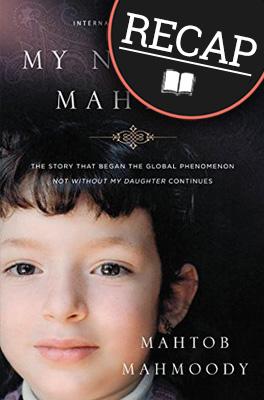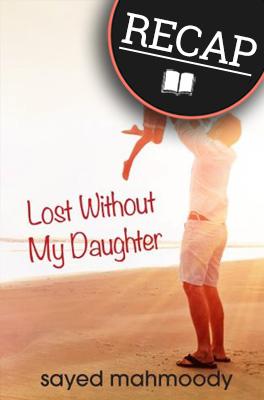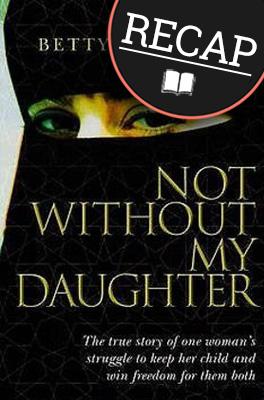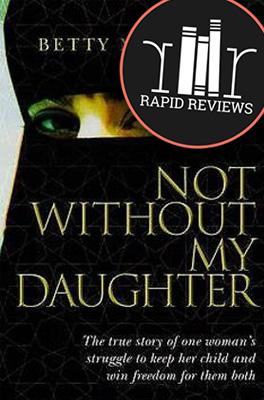Read a full summary of My Name is Mahtob, written by Mahtob Mahmoody, right here! This page is full of spoilers, so beware. If you are wondering what happened in My Name is Mahtob, then you are in the right place!
Special thanks to Sarina Byron, a BSR contributor who wrote this great recap! Sarina is a British Author and Contributing Writer living in California. Sarina enjoys bringing forth a different perspective and encouraging a different way of thinking through her writing. Visit her blog to read her reviews, and check the end of the review for a link to her Instagram.
Author
Mahtob Mahmoody
Ratings
4.6 stars on Amazon
3.88 stars on Goodreads
Add My Name is Mahtob on Goodreads.
***** Everything below is a SPOILER *****
What happened in My Name is Mahtob?
Trigger Warning: This recap is true to the books’ themes of violence, racism, Islamophobia, abuse, gaslighting, PTSD, emotional trauma, and kidnapping.
Mahtob had bought a home and was far from the life she had once known in Iran. However, she still suffered nightmares featuring a fox. She met a lady on a flight who had read her mother’s book. This opened the doors to memory lane…
Mahtob was six months old when her family had moved to Michigan. Her mother had become fed up with her father’s fanaticism and had threatened divorce. After the Iranian revolution, Moody had thrown out all the alcohol, mandated kosher food, and started practicing Islam again. Mahtob’s mother Betty had believed him to be a non-practicing Muslim when she married him.
Mahtob recalled their house in Thunder Bay where her parents showed her all the beautiful birds that came through. They taught her the names of each of the birds and looked out for the first Robins of Spring. Her babysitter Patty would paint her nails and take her to paint pottery. Mahtob recalled fun times with an Armenian family they were extremely close to and with her next-door neighbor Stacey, with whom she jumped in the sprinkler.
Mahtob’s recollections of Iran varied between visual memories and non-visual memories, which were accompanied by no images. She recalled arriving at the airport and being desperate to use the bathroom but refusing due to the stench. She recalled the hordes of relatives that came to receive them and the sheep that underwent ritual slaughter for good luck.
Ameh Bozorg and Baba Hajji’s home was resplendent with marble floors and chandeliers. It had layers upon layers of Persian carpets, which also doubled as dining areas. Delicious food flowed through the day and night, and fresh bread was purchased for every serving.
The two weeks passed in a blur, and when it was time to go home, Moody broke the unfortunate news to Betty. They were not going back to the States, Iran was their home now. When she protested, Moody struck Betty. It was the first time Mahtob had seen her father hit her mother.
After Moody broke the news to Betty, she got extremely sick with dysentery. Mahtob sat at her side day after day, watching her fade in and out of consciousness. Betty asked Mahtob to make sure Moody didn’t give her a shot. Mahtob sat there like a loyal soldier and made sure her mother was safe.
Back in the States, Mahtob was only allowed to watch television programs picked by her father. She was spanked when she watched The Smurfs with John. Moody didn’t want Mahtob to be influenced by American television, but in Iran, he forced her to watch everything. Moody let Mahtob watch this show about a bee who spends his days trying to be reunited with his mother. From the living room, Mahtob could keep an eye on their bedroom even as she watched television. Mahtob’s fifth birthday was spent in a painful haze as she had tumbled off a stool and received stitches on her arm without anesthesia.
When trying to write her name on a gum wrapper, Betty realized she was too weak. She didn’t think she would survive much longer, and something needed to change. She decided to get along with everyone and convince them she had accepted her new life. Betty convinced Moody they should move out to Mammal and Nasserin’s home, where he raged on for days. Mammal and Nasserine couldn’t intervene as Moody outranked them in the family hierarchy. Life in the small compound was bleak, but it became even bleaker when the air raids began. Moody blamed the US for Iraq’s attacks.
Mahtob remembers the day Moody attacked Betty viciously and the other adults stood by and watched. She tried to stop her father, but he hit her and pushed her away. Things were made worse by the constant air raids. The smell of burning flesh accompanied the smoke and explosives. Moody watched them constantly.
Moody told their family in the States that the government wouldn’t let them leave. He also sent them letters and pictures to demonstrate that they were happy in Iran. Their family sent them care packages, but most didn’t make it past Moody. Mahtob’s babysitter Patty sent her university badge, and someone else sent her chewing gum.
Moody decided it was time for Mahtob to start school. Mahtob disliked her new uniform and the dirt field surroundings. She seethed at the idea of having to insult an image of the American flag painted on the ground. Mahtob recalled her teachers asking questions about the life of their parents in an attempt to find the rebels. They wanted to know what the parents read, whether they listened to music, and many other such intrusions.
School was more a case of repeating the hypnotic chant of the teacher rather than learning to think. Homework was a case of repeatedly copying something until it penetrated your brain cells. Even Moody, who wanted his daughter to be Iranian, thought this was excessive. Moody was a perfectionist and would be incensed with the accented way Betty spoke Farsi, but Mahtob picked up the sounds and script well.
Mahtob was an outcast at school. Being American was not helpful at all in this regard, but all this changed when Betty made her a celery and peanut butter treat for lunch. Mahtob shared some with her friends on her mother’s insistence, and they received it well.
Mahtob didn’t like to play with her cousins, but her father forced her to. Their games included playing pretend wife and husband, where the women would rebelliously abandon the chador at home but rush for it when the husband banged on the door.
The school’s regimen even seeped into the children’s coloring books. The colors had to mirror the finished picture of the other page, and even her cousins reprimanded Mahtob when she differed. Mahtob noticed the soldiers who came to speak to young boys about the sacrifices they could make for their country. The Iranian government sent the young boys ahead of the military to walk for landmines.
Mahtob recalled how Moody would make Betty go out twice to run the same errand, the first time to gather the price and the next to purchase the item. This was an improvement on Moody going with her as he used to follow her around before then. Betty knew as long as she willed it, a way would appear. Her father had taught her that, and miracles began to appear.
While asking around for change for the telephone, Betty met Hamid, who owned a shop and let her use his phone. Betty got in touch with the Swiss Embassy and started working with Helen. Soon the school teachers began to help by allowing Betty and Mahtob to come late.
One morning, they took a detour via Hamid’s shop and saw a flock of birds pecking at their seed. They took a minute to enjoy them. As they were buying bread with Moody that evening, Mahtob remarked the birds were still there. Moody immediately caught on that they had not gone straight to the school. Mahtob had to remind herself she must not make another mistake like this one. Mahtob began to hate her father as she had to “forget” things to ensure such events didn’t recur. Back in Michigan, her stepbrothers and the rest of her family were seething and praying all at once as well, much like Mahtob.
When Betty’s father fell ill, they pleaded with Moody to allow Betty to see him. To their surprise, he did, but on the condition: that Mahtob would stay in Iran with him. This set off a confusing set of events for Mahtob. While her father was preparing for her mother to depart alone, her mother was promising her that she would never leave without her. In this confusion, Moody made Mahtob sleep in her own room, where she faced the terror of night raids and her mother leaving all alone.
Mahtob now began to think her mother was lying to her. The morning they were able to make their escape, Moody unknowingly thwarted an escape plan. He decided to take Mahtob to school himself. In the afternoon, as Betty was trying to contact Amahl, who was in-charge of getting them out, her friend arrived with her daughter. Moody was forced to leave Betty and Mahtob in her care when an ambulance arrived to rush him to the hospital for an emergency. As soon as Moody left, Betty excused herself and left the room.
Mahtob was immensely confused; both her parents were excellent hosts. They would never leave a guest alone without attending to them. She went upstairs to see what was going on. Betty was frantically putting her things in a large purse. When Mahtob asked what was going on, Betty asked her to go downstairs and wait for her.
Mahtob was alarmed. In all their time in Iran, she and Betty had talked at length about their hopes and dreams of going back. However, recently Betty had stopped communicating with her as much. Mahtob took this to be a sign Betty was abandoning her.
Betty asked their guest to drive her to the market to buy flowers for their host that evening. The friend suspected nothing and took them to the market. Their guest offered to drive them back, but Betty insisted they walk back. When she insisted again, Betty simply hugged her and thanked her. Perhaps she understood the implied meaning, but if she did, she gave no indication of it.
Betty ran to a pay phone, and a silver skirt fell out of her bag. Mahtob picked it up and wondered why she had brought a silver skirt when buying flowers. Then she heard her mother tell someone they were out of the house and she had Mahtob. The man tried to say they weren’t ready, but Betty was insistent. He relented and gave Betty an address to head to.
As soon as she hung up, Betty looked Mahtob in the eye and told her they had an opportunity to go home, but this meant she may never see her father again. Mahtob started crying because she realized she hadn’t brought her bunny. Betty explained if they went back to get the bunny, they could never leave again. She promised to buy her a new bunny when they got home. Mahtob considered the two options and then nodded in agreement that she wanted to go back to the States.
After that everything took on an ethereal quality, like scenes in a View-Master. Their taxi got into an accident, and as they alighted, they heard an announcement about a woman and child on the run. As she heard the grown-ups planning their escape, Mahtob grew to like the man immensely. His compassion for their circumstances and Mahtob’s childhood had made all this possible.
Mahtob played briefly with a woman who came to see them. She noticed her jingling bracelets and hoped to have an arm filled with bracelets like hers someday. Mahtob heard her mother speak to someone on the phone. She was angry and was talking about lawyers and taking Mahtob back. Mahtob began to panic again.
Next thing she knew, they were in a car saying goodbye to the kind man who had helped them. They reached Tabriz, where their driver got into an argument with the police. Mahtob and Betty were ushered into another car. They were shot at in the Red Cross vehicle, and the driver left them by the side of the road. Betty wondered if they should move, and Mahtob reminded her she had taught Mahtob to stay where she was. That way, Betty could always find her. Mahtob now urged her mother to stay where they were as the men knew where to find them.
They were picked up and taken to another location, where Betty had to change clothes to blend in. Here, they were given sunflower seeds, which Mahtob saved and refrained from diving into lest Betty not eat any herself. She worried about how frail her mother had become. Much like her mother, Mahtob developed a fondness for Mohsen, their guide.
They were briefly separated as they rode different horses across the border. Mahtob noticed all the smugglers seemed worried at one point. That would turn out to be the time when Betty’s body gave way, and they had to carry her over. Mohsen delivered them across the border and parted from them. They were all sad, and once again Mahtob wanted to ask one of these kindly men to stay with them.
On a bus to Ankara, Mahtob and Betty fretted all the way about soldiers inspecting their documents. They had been issued passports by the American Embassy, but without the necessary stamps, they were pretty worthless. In Ankara, they drove past the embassy, which the driver took the time to point out to them.
They had barely settled into a hotel when the hotel’s manager spotted the problem with their passports and asked them to leave. They called the US Embassy, where the night guard scoffed at them and hung up. Betty called her family in Michigan and begged them to ask the State Department to help them in Ankara.
Betty asked the hotel clerk if they could spend the night in the reception area as there was a curfew in Turkey at night, and they couldn’t go out. The clerk called them a taxi and sent them away heartlessly. They arrived at another hotel, where the clerk took pity on them and registered them under another name.
The embassy was extremely warm to them the next morning. The embassies in Bern and Tehran had been monitoring their situation for nearly eighteen months. They were worried the night guard’s response had endangered them. Betty and Mahtob were presented with a feast of hamburgers and raspberries, but starvation had rendered their appetites useless.
Mahtob was given some coloring books to stay busy with, although they made it very clear the books were on loan only. She drew the peaks they had traversed to get there. Mahtob drew the American flag and asked Betty how to spell America. She carefully wrote the name above her drawing of the flag. Just as she finished, they were whisked away for their flight home. Three decades later, Mahtob still thinks about those coloring books she wasn’t able to return. They changed flights in New York and were in Detroit before they knew it. When they reached her grandparents’ home, Mahtob ascended the stairs waiting for her grandfather to “boo” at her from a corner. He had not forgotten and dutifully got out of bed with his IV drip to fulfill their tradition. Mahtob asked her grandma to make every kind of pie she knew how to. Tucked into bed with her grandparents that night, Mahtob and Betty said their night time prayer. When Betty said goodnight in Farsi, Mahtob was infuriated and asked Betty never to utter “Khomeini’s language.”
Despite his temporary recovery, Mahtob’s grandfather began to succumb to his illness. His hospital bed was set up in the living room, where he would watch the bird feeders and dream of fishing.
Over a visit to family friends Doug and Karen, the subject of turning their escape into a book arose. Karen’s brother worked in publishing, and they could start from there. Betty was anxious about Moody’s retribution when she received a call from a William Morris agent. He asked her if she would be willing to write a book, and she refused on account of the timing being bad. The next day, he called back offering a large amount in royalties.
By now, the rest of the media had become aware of her story, and Barbara Walters called to speak with Betty. She was given the number of the hospital by Mahtob’s grandmother. Her call caused quite the stir at Carson City Hospital.
While all this excitement was shaping their new lives, everyone retained a fear of Moody’s return. They found out that while they were in Iran, Moody had sent Mammal back to liquidate their assets. All their money now sat in a Swiss bank account in Moody’s name.
The interview with Barbara Walters was an exciting new chapter in their lives. She gently asked questions that fostered a sense of intimacy between them. That evening, Barbara Walters took Betty, Mahtob, and Joe to dinner at Benihana. Mahtob went to a Broadway play for the first time and took a carriage ride around Central Park.
For John’s sixteenth birthday, 20/20 sent a camera crew to capture the family celebrations. It turned into an emotional time as John shared his anguish over not knowing whether Betty and Mahtob were alive. This was one of the only times the family discussed the pain of the experience. Betty belonged to a generation that didn’t deal with their pain, but she wanted to change this with Mahtob.
Normality took its own sweet time to appear. Mahtob’s English was still catching up with her geographical location. She used a Farsi word with her cousin one day, who joked about her speaking in tongues.
The family’s collective stress grew by the day. The men gathered often to discuss what they would do if Moody showed up. A gun was kept handy behind their grandfather’s bedroom door, and Mahtob was diligently watched. Everyone panicked the day Mahtob couldn’t be seen. They found her crouching behind the couch. She’d heard an airplane and assumed it would drop a bomb.
That August, her grandfather passed away. While she was sad at his passing, she didn’t understand why everyone was sad that his suffering was over.
It was time for Mahtob to join school. Betty enrolled her in a private school with a new name: Amanda Sue Smith. This was necessary because to legally separate from Moody, Betty needed to send him a notice, which would tip him off to where they were. They couldn’t legally change Mahtob’s name, but nothing stopped them from using a new name.
The new name was easy to adjust to, but relating to children her age was not. Mahtob had trouble staying in her seat and would keep standing up out of force of habit. Finally, another little girl Jamie made the first move and everyone else followed suit.
That year, they moved into a new home. School became Mahtob’s sanctuary, and the prayer routine became her strength. Each class was accompanied by a bible lesson, which turned into the highlight of Mahtob’s day. Mahtob learned about forgiveness and human nature through these lessons. These were put to test when Betty told her a plane crash in Iran had killed a lot of people. Mahtob displayed no empathy and said she wished her father was one of the dead.
Betty realized Mahtob was turning bitter and took matters into her own hands. She started bringing their good memories and Iranian customs back. She took out their old photos and started reminding Mahtob of everything she used to do with her father. Looking at the pictures made Mahtob want to hold onto the hatred even harder, but her perception began to change. She realized no matter how hard she fought it, she resembled her father a lot. She couldn’t hate him forever, but she was trying hard.
Betty worked tirelessly to get Mahtob to accept her Persian heritage. She cooked Persian food and spoke fondly of good times with Moody. Mahtob began to remember how she used to sit at her father’s feet and cut out the heart from discarded medical journals. She remembered how Moody used to tell her about the vitamins in each fruit and vegetable. Moody had taught her about the wonders of yogurt and the healing powers of saliva, little reminders of a beautiful relationship with her father.
When Betty became a Mary Kay consultant, Mahtob asked for her to do her eyes like Persian ladies. Betty didn’t know what she meant, but their Armenian “relative” Vergine helped out by giving her the make-up she wanted. Mahtob also restarted wearing gold bangles. She had always loved them on the arms of Persian ladies and loved to have her arms jingling with them.
One day at the bible class, Mrs. Hatzung asked who had been baptized. Mahtob asked her mother and decided since she had not been baptized, she would like to be now. Her entire class attended, and she was baptized by their priest in a beautiful ceremony.
They moved homes again, and by now, Mahtob was a permanent fixture in Betty’s bedroom. Mahtob grew accustomed to Betty’s night terrors. They had escaped, but they now constantly lived in fear. Betty started carrying a weapon as a precaution. They also installed an alarm system at home, and Mahtob wore a panic button every time she went out.
When Betty appeared on Good Morning America after writing Not Without My Daughter, they had a mixed reaction from their community. Some people admired her courage to speak up, and others were enraged their secrecy had endangered their own children. Betty started traveling to promote the book and give interviews, and Mahtob spent more time with her grandmother. Her grandmother taught her to crochet and play cards, and they watched country singers on TV.
Betty bought Mahtob a gold bangle from one of her trips. Mahtob loved her gold bangles so much that she wore them until she outgrew them and they had to be cut off by the goldsmith. Betty understood the grief of losing her gold bangle and bunny and replaced the bangle to bring her a measure of comfort. This bangle would never need to be cut as it was unfastened with a button. One loss had been remedied forever.
Mahtob had never read her mother’s book. However, she developed a beautiful relationship with her German Editor Anja. Anja recognized that Mahtob needed to preserve her memories, and the book would not contribute positively to that end. By preserving her memories, Mahtob also learned the lesson of forgiveness through Nowruz. She grew the wheatgrass every year and threw away her resentments when she got rid of the stalks. Mahtob felt blessed she was surrounded by adults who gave her the strength to forgive her father.
Mahtob began to travel with Betty to give interviews and attend talk shows about their experience. Mahtob’s teacher asked her to journal about her feelings on their trip. When she returned, her teacher bound the pages in cardboard and presented Mahtob with her first book.
Betty’s book had gained international fame and been nominated for the Pulitzer Prize, which meant their travels were now international. Mahtob experienced London, Scandinavia, Copenhagen, and many more. During one interview, a reporter pressed Mahtob to give the name of the man who had helped them escape. This put Mahtob off from speaking to more journalists.
The journalists may not have been a delight, but the food was another matter. Mahtob relished high tea in England, hot chocolate that changed in flavor and texture in each country, and delicious gazpacho. Their travels didn’t allow much time for sightseeing, but Mahtob didn’t mind. She enjoyed the diverse array of food and people.
They met people who offered them love and support. They invited Mahtob to be pen pals, and many women promised to name their daughters Mahtob. While Betty was vocal, Mahtob borderline frustrated her hosts. Barbara Walters pulled Mahtob on the stage for an impromptu appearance on the show, and Mahtob recalled how she was the only person to be interviewed by Barbara Walters twice and not answered a single question.
Unwittingly Betty became an advocate for international child abductions. One night, social services asked if Betty could take in six people, three sisters and three children, belonging to one of them. The father was trying to sell the youngest sister to a man in Palestine, and they had fled. Countless people came to their lives in this manner, and over the years Betty saved 78 children.
The movie came a few years before Betty’s life as an advocate and really helped pick up the pace of the cause. They filmed it in Israel, and an unveiling of a large mural of Khomeini had everyone panicking. They had to hold a press conference to quell everyone’s fears. Betty and Mahtob built a special relationship with Sally Field, Sheila, Alfred Molina. Alfred Molina specifically was extremely friendly and social. He made a special point of explaining to Mahtob that he wasn’t hurting Sally.
Sally’s makeup artist became Mahtob’s favorite person on the set. He took it upon himself to break Mahtob out of her shell. Mahtob got to be an extra on the set that was filming her own life, and Betty and Mahtob explored Tel Aviv together.
Mahtob experienced some intensely scorching rashes all over her body. It didn’t seem like a sunburn, but it caused a lot of agony. While they were in Israel, they were invited to Seder by the movie’s photographer. Betty and Mahtob experienced Passover traditions of sharing bitter herbs and reading ancient texts.
The release of the movie coincided with the conflict in the Middle East and was seen as a bad political statement. Most people appreciated the movie, though. In fact, after one screening, Alfred had to be removed via a secret exit as people couldn’t distinguish between him and the real man.
Although not intended, the movie was perceived as a political statement against Muslims and Iran. When Betty moved on to her next book, Mahtob and she spent a part of the summer working in Paris. It was in Paris that Mahtob began to do less with her days. Betty thought she was simply being lazy, but a more ominous problem was lurking under the surface.
Betty and Mahtob moved to a beautiful house with a fenced-in backyard opening onto the river. The idea was to recreate the home she had known before Iran. Betty hired someone to stay with Mahtob as she was traveling too frequently for her grandmother to keep staying with her. Her new “friend” Lori didn’t want to be called babysitter or nanny, so she was just the lady who stayed with her. Everyone in Lori’s family grew incredibly fond of Mahtob, especially her boyfriend.
The fear of Moody’s return still lingered, but they began to relax a little bit. They found themselves feeling especially tense around Halloween as a disguise made it hard to recognize people.
Things were beginning to feel like normal when Mahtob started experiencing extreme migraines. During this period, film crews often followed Betty home. One journalist got Mahtob to answer a question she had been avoiding for ages. In response to how she felt about her dad, Mahtob said she didn’t believe he deserved the privilege of being her father any more. He had abused his right and had lost it as far as she was concerned.
In the course of these interviews, Mahtob and Betty met Maria Shriver. For the interview with Maria Shriver, Betty invited a victim of international child abduction, Marian. Marian’s husband had kidnapped her children when she was away on a work trip and taken them to Iraq. Marian’s visa was denied, and her case was always sidelined in favor of other pressing international issues.
On the day of the interview, Marian’s husband asked for her permission to return via Jordan. She granted that permission on the condition that he bring both the children back. When he arrived, he was promptly arrested. To their distress, they realized he had only brought their son back. Their daughter was still in Iraq. Such cases fueled Betty’s days, but Mahtob craved a normal life.
Shortly after she turned thirteen, Mahtob was preparing for a high school footgame with her friends in a cloud of aerosol spray and make-up. Betty burst in just before they were about to leave and announced she had found the perfect home in Alpena. They fought about moving, and Mahtob broke her toe when she slammed the door shut on Betty. She didn’t want to admit defeat, however, so she didn’t tell Betty how badly she was hurt. The damaged toe was only discovered years later.
Betty was receiving awards of honor from several countries. It was during one of these trips that Mahtob’s rash showed up again. She was examined by a doctor in Michigan, and they found out it was lupus. Anja took the news particularly hard but set about trying to help. She found them a client of hers who was a doctor and had treated his own MS successfully.
As they pondered this, Mahtob continued to make the list of everything. Everyone around her treated her with kid gloves, but she continued on as normal. This changed when she started spiraling for the worse. She had no energy and was covered in rashes. They decided to head to Germany and see Dr Franke. The miraculous treatment began to work, and Mahtob’s lupus started reversing itself.
Mahtob chose a Christian boarding school for herself, but her first year was marred by Betty falling sick. Betty and Mahtob joined a protest against women being disallowed from Olympic games by certain countries. After Betty’s recovery from her surgery, they resumed their trips to Germany for Mahtob’s infusions.
During one of their trips, Mahtob’s classmates voted her their class representative to homecoming court. Mahtob needed to be escorted to the field. This was a role typically fulfilled by men, but in Mahtob’s case, it would be her mother. To the sound of loud cheers at homecoming, Mahtob felt grateful for everything they took place in Iran. She discovered only gratitude in her heart.
Mahtob began to think God had given her lupus to give her a voice of her own. During a press trip to Paris, Betty was threatened by Moody once again. Mahtob started getting phone calls at home from someone claiming to be a parent she was helping. He kept asking for her number, but Mahtob didn’t give it. The Iranian government insisted Betty’s interview should include a statement from Moody. His statement simply reiterated that Mahtob was a Muslim and belonged in Iran. He didn’t say anything about missing her or loving her.
Mahtob graduated from school and went to Michigan State University. She decided she no longer wanted to be a teacher but would rather study psychology. She found university more difficult after her school. Where her school has been strongly Christian, her university was secular. Mahtob got into trouble for having a religious view on scientific matters. She perceived people around her to be anti-Christian. When people objected when she defied the theory of evolution, she thought them to be bigoted.
Mahtob received emails about her story all the time, but some emails seemed suspicious. Her instincts were alerted by someone mentioning private details of her education which couldn’t be known to anyone except those who knew her. Then came the phone call from Moody. He called Betty and asked to speak with Mahtob.
Mahtob woke up to numerous messages from Betty, asking her to return her call. When she did, Betty was nearly at her door. She asked her to pack some stuff and meet her downstairs. They went to Chicago to renew Mahtob’s passport and to stay away from their homes as much as possible. When they were tired of life on the road and Mahtob couldn’t stay away from school any longer, they returned home, but Mahtob didn’t move back into her dorm.
Everyone was on alert, and strange things started happening around their homes. There were calls at Betty’s home where no one spoke. The garden doors were unlocked at Betty’s door fifteen minutes after they had been locked. Someone fired a shot outside Joe’s house. All of this had happened because of the Finnish producer. He had tracked Betty and Mahtob down for Moody.
Mahtob was under immense stress. She was followed to her car by a man asking if she was Mahtob as he had a package for her from her father. Mahtob denied her identity and walked away, praying the Finnish film crew didn’t hop out of a nearby van. She collapsed when she heard their footsteps retreating.
Within the safety of her car, she cried and headed to the police station to file a report. She learned from the police investigation that they had been trying to deliver a video message to her. Mahtob turned it down as she had no interest in what her father had to say. The police gave her a parking permit in the faculty lot, patrolled around her classes, and encouraged her to report anything suspicious.
Mahtob reported a middle-aged man who seemed to be suspicious as he smiled at her every time she walked by. It turned out he was just a friendly professor.
A few days later, when she was taking her niece Kelsey back to her brother’s house, she found the door locked when her brother had told her he would leave it unlocked. Their dog tried to warn her, but they only understood his meaning when she felt the lock on the door. She quickly backed up and drove away without giving away her suspicion. Mahtob called John from her car, who testified the door had been left unlocked. John asked her to drive away and headed over to check the house himself.
For her senior year, Mahtob moved into an apartment with her friends, Brian and Trish. At the university library cafe, she saw a boy assaulted by three others and was incapable of reacting. The sound of fists on flesh froze her in place. Time slowed as the assault took place, Mahtob looked pleadingly at people around her. No one helped him, and Mahtob wondered when she had lost her courage.
Witnessing the assault transported her back to Iran when her father would set off with little to no provocation. She remembered trying to break it up one time by screaming that she needed to go to the bathroom. That worked, and he let Betty take Mahtob to the bathroom.
While she had managed to stall one assault, she couldn’t help the one that came later that night. Moody saw Mahtob sticking her finger down her throat to induce vomiting and interrupt his assault so he went after her. That’s when Betty asked Mahtob to fetch Reza. Mahtob remained outside their closed door until Moody came and took her away. He left Betty in the apartment screaming after them.
Betty had prepared Mahtob for a separation by teaching her songs that would bring her comfort. Moody tried to question Mahtob while she was alone with him. Mahtob remembered ignoring his questions by singing in her mind. Mahtob was especially miserable during the air raids because of her worry for Betty. Ameh Bozorg finally pushed Moody to take Mahtob back as she was miserable, and they were reunited during an air raid.
The unexpected intrusions had an adverse effect on Mahtob’s lupus. Her doctor traced her flare ups back to his intrusions, and the stress of his requests never went away. Moody had begun to speak of his failing death and impending death. Dr. Beals asked Mahtob to consider praying for her father, confident it would heal her soul. Mahtob was never receptive to the pills, but now she was actively rebelling against them. Despite being completely aware of the impact, she discontinued them against the advice of her doctor.
In her Psychology Affect and Self-Esteem class, Mahtob struggled to come up with a list of happy things in her life. This pushed her to go out and collect some. When she started looking for happiness, she found it everywhere. Mahtob noticed people enjoying the beautiful spring day and shared in their joy. Mahtob remembered times with Vergine, who taught her how to line her eyes like in the Middle East and to read her coffee cup. Vergine always made sure to tell Mahtob she was incredibly loved by God and he had beautiful plans for her.
Almost attesting it in her mouth, she went to get some Arabic coffee at the local Lebanese cafe. The shop owner refused to give her Arabic coffee. He assumed she wouldn’t like it. Just to prove a point, she sat and finished every last drop of it. Back in class, she found most people had struggled to collect happiness. They realized they all went through life with blinders on. The simple act of speaking about this experience brought them all much closer.
A visit to Dr. Beals revealed Mahtob was recovering well without her medicines. Mahtob was in part inspired to cure herself with diet and exercise by her father. Moody had always stressed the importance of diet and exercise, but the literature on lupus was limited. Mahtob realized milk and dairy appeared to slow her down, so she became vegetarian. She regularly practiced yoga and deep breathing visualization.
Dr. Kauffman, her Affect and Self-Esteem professor, changed her life when he conducted an eye contact exercise in class. It helped Mahtob shed her intimidation of looking people in the eyes. Although he helped her immensely, Mahtob never overcame her shyness enough to tell Dr. Kauffman how much his class meant to her.
Mahtob met a man through her friends who didn’t let her know he had read Not Without My Daughter. They increasingly spent time together and talked about her time in Iran. Mahtob was now living on her own and working at Carson City Hospital, where her parents had met. Unsettling things began to happen to her at the apartment, and she realized someone was visiting her apartment when she was away.
Mahtob tried to catch the intruder in the act by setting up cameras, but they still went in and recorded it. Twice, the evidence was indisputable as the intruder knocked over a plant and took the security tape with them. Mahtob was scared enough to take shooting lessons but didn’t buy a gun. When the police gave up on the hunt, Mahtob gave up her apartment. She was miserable as she had moved back home at the age of 25.
Mahtob believed God provided a solution by way of a job in another town where she could begin anew. One evening as she sat discussing these life changes with her new boyfriend, it felt like someone was trying to break into her apartment. Mahob wanted to call the police, but her friend didn’t think they could get there in time with the heavy snow. He went out to investigate by himself and realized it was only the wind.
Although things worked out this time, Mahtob worried about how ethical it was to expose someone else to this danger. She remembered another boyfriend in the past who had watched the movie before and after he met Mahtob and found himself infuriated by what she had endured. Mahtob found this repeating itself as a pattern: People would grow in anger towards her father and their desire to protect her.
Her Uncle Pete was a similar example. He visited Mahtob at her new place and told her over dinner about a time she asked him not to shoot her father if he showed up. He felt his heart break at her request as no little girl should have to worry about things like that. Mahtob remembered her concern about someone hurting her father.
Mahtob came across a package from Amoo Kombiz, her father’s friend, who had cut off ties with him over his treatment of Betty and Mahtob. He had sent it to Mahtob years ago when her father had been desperately trying to contact her. Amoo Kombiz had played a prominent part in Mahtob’s childhood, telling her the story of the Persian New Year and teaching her the Persian way to eat a pomegranate after Moody had left a void.
Mahtob had avoided the package for as long as she could but decided to open it and treat it simply as information. She found a letter from Amoo Kombiz sharing his interactions with her father. Moody, he said, had lost both his kidneys and was on dialysis now. He sent all his communication with Moody and offered to play middleman should she wish to contact him.
She had skipped reading those letters years ago but was faced with the decision again. Amoo Kombiz told Moody about how marvelous Mahtob was in his letter and how it was Mahtob’s decision to turn down the invitation from the Finnish team. He told Moody that Betty would never interfere with Mahtob’s decision to speak with Moody and meet with him. Mahtob, however, was a different story.
Moody wrote back he was not surprised people felt sorry for the abused Betty in the book. However, that is not the real Betty nor was that her life in Iran. Moody claimed the book was all lies cooked up by Betty’s co-author. He claimed he had never lied to Betty, their visit had been open ended, and he had intended to help those injured in the war. They had a beautiful home and loving family as far as Moody was concerned. He also objected to Betty claiming she only showered twice while in Iran, Iranians showering once a year, and Iranians eating food ridden with worms and roaches. He claims they were envied by all their friends and the only ill-treatment was suffered by him as the Iranian government forced him to work for free for over half a year before accepting his qualifications.
Kombiz challenged Moody on his claims. He distinctly remembered Moody becoming fanatical after the revolution, Betty hiding his passport so he couldn’t leave on the quiet, and Betty meeting a woman in Athens who was trying to get an American passport for another woman stuck in Iran with her daughter. Kombiz reminded Moody he had not been a victim of politics but of his own biases. He distinctly remembered Moody cussing out the US and ignoring the identity of his wife and daughter. Moody could have just as easily looked after his American patients; the identity of his patients should have never mattered to him. He declared no one had won in this situation, and it was sad that Moody had brought that about.
Reading his letters made Mahtob realize Moody seemed to love the idea of her and her accomplishments but had very little concern for who she was. His reality was his alone and didn’t need to be rooted in actual fact. As Mahtob contemplated the letters, she realized Amoo Kombiz said everything she would have to her father. She saw how her father pointed the finger of blame at her mother when he had the one chance to take responsibility in private. Mahtob didn’t have the reaction Kombiz hoped for her to have, but she once again made peace with him.
Mahtob slept with her father’s jumper that night. The next morning, she emailed Kombiz to wish him for Eid and attached a picture of her father and him. He explained she was not late in wishing him for Eid. It went on for thirteen days and was a Zorastrian tradition, predating Islam in Iran. He explained a restaurant in San Jose had applied for a permit for the ritual fire which children and adults would jump over and the police refused to understand. They relented on the condition that a fire truck would be at hand and would be paid for by the community. All was well until two ladies came dressed in nylon.
Kombiz was pleased to see Mahtob referring to her father as “dad” and shared that her father had finally seen the error of his ways in their many email exchanges. He regretted blowing up his life in Corpus Christi over his religious ideology. Kombiz asked Mahtob if she was still religious; he had quite given up on it himself as not only seemed to sow discord.
Mahtob responded with gratitude at Persian culture lessons for him. She related the story of her past and present Nowruz celebrations. Mahtob shared her resentment of him and apologized after having re-read his letters and confronting Moodyon their behalf. She shared that she was still religious but didn’t believe in forcing it upon others. She sent him a copy of The Weaver’s Poem, which reminded her of Persian carpets.
Mahtob believed the biggest service this book did for her was to help her close a chapter of her life that needed closing.
There you go! That’s what happened in My Name is Mahtob. We hope you enjoyed this My Name is Mahtob summary with spoilers.
Ready to read My Name is Mahtob? Click to buy and help us pay for hosting!

What now?
Don’t forget to check out Sarina’s blog, and you can follow her on Instagram!
Follow Book Series Recaps on Instagram and Twitter.
Friend us on Goodreads: Sara and Stacy.
Check out awesome art, quotes and more on Pinterest.
Oh and share this with your friends who might like to read a recap of My Name is Mahtob.
























